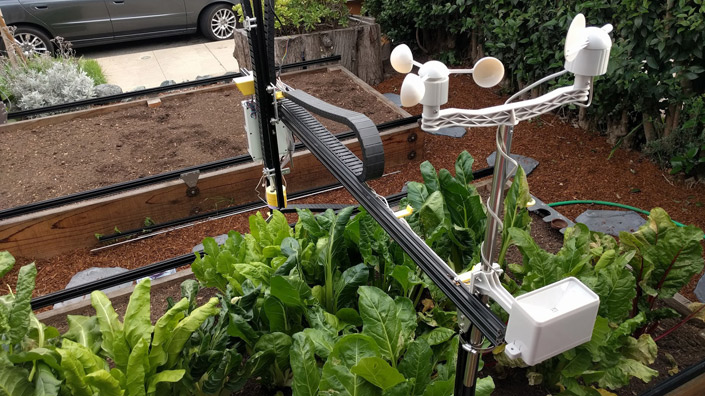Articles
Modern, large scale farming is often criticised for the depleting effects it can have on the land, the chemicals it uses and the impact it can have on wildlife. For people who would like to take back control over where and how their food is grown but lack the skills or time to do so, a company has developed a novel solution: a personal robot farmer.
Called Farmbot Genesis, it is described as ‘the world’s first open source, CNC farming machine’ designed to grow food in an automated and precise fashion.
Aimed at individuals, families, and small-scale commercial farmers, founder of Farmbot, Rory Aronson, says: “It is like a very large 3D printer, but instead of extruding plastic, FarmBot plants seeds, waters them, and uses sensors to learn about the soil the plants and the environment in order to farm smarter.”
Flexible farming
Farmbot moves around in the x, y, z space, 24/7 and is able to grow and tend to a wide variety of crops. To achieve the kind of flexibility needed for this task the team developed a universal tool mounting system to allow the robot to automatically switch between tools. This provides 12 electrical connections, three liquid or gas lines and magnetic coupling to support a wide range of tools. So far this includes a watering nozzle, seed injector, soil sensor and weeding tool but more can be added depending on the users needs.
The Farmbot’s core electronics include a Raspberry Pi computer, an Arduino mega micro controller and a RepRap Arduino Mega Pololu Shield board. This is combined with a powerful Nema 17 stepper motor and rotary encoder tools so that it can precisely sow seeds within mm accuracy in any pattern or density. Once the seeds are sown it will then water each plant based on its type, age, soil conditions, local weather and the user’s growing preferences. This allows Farmbot to grow a wide variety of crops in the same area at the same time; an agricultural concept known as polyculture, which lowers the risk of plant’s susceptibility to disease and increases local biodiversity.
A smart farmer

An on-board camera and advanced computer vision software allows the robot to monitor the garden and detect weeds as soon as they emerge. It will then bury them under the soil. “FarmBot uses sensors and software based decision support system to learn about the plants and environment and then farm smarter and more efficiently,” says Aronson.
The robot is built from corrosion resistant aluminium, stainless steel and 3D printed plastic to be able to operate in harsh, outdoor conditions. It can run off mains electricity from a wall outlet, or be powered with a small 100W solar system. If it encounters a problem or a loss of power, then the owner will receive an email notification.
Flat pack robot
Users must build and set up the robot, but this doesn’t require any coding or technical know-how. Aronson stresses if you can build IKEA furniture, then you can build and use a FarmBot.
The system is operated via a web-based interface with a user-friendly sequence builder and scheduler to plan seed injection, watering and regimens to take care of a plant throughout its life. The user can tell FarmBot how to take care of that plant, or import a growing guide from OpenFarm.cc.

A game-like, drag and drop farm designer means users can graphically design the layout of the plants they want to grow, then just press a button to get Farmbot to carry out the rest.
Importantly for the Farmbot team, the hardware and software platform is open source and can be modified and expanded, with all the plans and 3D CAD models free to download and alter. There is also a community wiki page and forum for users to collaborate and share modification ideas.
Aronson says: “Because food is a fundamental need for all humans, I think open-source is the best way to empower people to truly own their food.”
A Farmbot Genesis system costs $3100 (£2400) - quite a high initial investment for a lot of families. However, the company plans to offer larger and lower cost devices in late 2017. Farmbot has sold $800,000 worth of kits in its first month of sales.